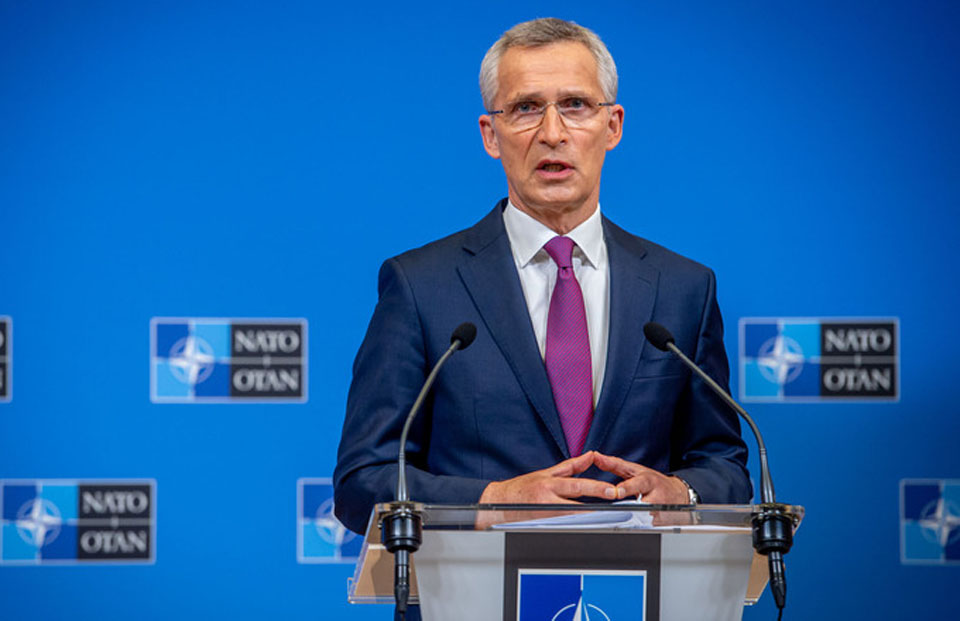Laura Kuenssberg: West facing 'authoritarian' alliance, says Nato chief
An "alliance of authoritarian powers" is working more closely together against Western democracies, the head of Nato has warned.
Jens Stoltenberg told the BBC that Russia, Iran, China and North Korea are increasingly aligned.
He also said he was confident allies of the Nato military alliance would agree a long-term funding deal for Ukraine by July.
But he suggested Ukraine might have to decide on some "kind of compromises".
Mr Stoltenberg was speaking to Sunday With Laura Kuenssberg, in an interview to be broadcast on Sunday morning.
On the Middle East conflict, he said it was "very important" that the US and other Nato countries conveyed "a very clear message to Israel" that they have to do "significantly more" to protect civilians and aid workers after the World Central Kitchen convoy attack.
Mr Stoltenberg took over as the leader of Nato, the Western defence alliance, 10 years ago.
Speaking to mark the 75th anniversary of the organisation, he told me the world was now "much more dangerous, much more unpredictable" and "much more violent".
He said there is an "authoritarian" alliance giving each other practical support that is "more and more aligned".
The Nato chief explained: "China is propping up the Russian war economy, delivering key parts to the defence industry, and in return, Moscow is mortgaging its future to Beijing."
Russia was providing technology to Iran and North Korea in return for ammunition and military equipment, he added.
Mr Stoltenberg told me that Nato had to work with other countries beyond its geography - such as Japan and South Korea - to "stand up against this stronger alliance of authoritarian powers".
The Nato chief has been trying to persuade other countries to commit more money to the war effort in Ukraine in recent days in the hope of a five-year, 100bn euro (£86bn) fund. He said he was confident he would get an agreement by July, despite some countries expressing hesitation this week.
Long-term support was vital now, and to rebuild the country after the conflict, he said.
"Even if we believe and hope that the war will end in the near future, we need to support Ukraine for many years, to build their defences to deter future aggression," he said.
However, while Mr Stoltenberg said that military support was vital to repel Russian forces from Ukraine and force Putin to give up his goals of occupation, he also suggested that Ukraine might ultimately have to make concessions too.
"At the end of the day, it has to be Ukraine that decides what kind of compromises they're willing to do, we need to enable them to be in a position where they actually achieve an acceptable result around the negotiating table," he said.
He said he was not calling for Ukraine to offer concessions now, and added that "real peace" would be achievable when "Ukraine prevails". But his language is notable because President Volodymyr Zelensky has always been adamant that he would never negotiate with Putin despite some calls on him to do so, including from the Pope.
Mr Stoltenberg refused to be drawn on whether he was concerned about the possible return of Donald Trump to the White House, saying only that he was sure the US would continue to be an important ally, whoever was in charge.
But his remarks about the way regimes around the world are working together are a reminder for Western leaders of the complicated and dangerous diplomatic jigsaw they have to piece together.
More than two years into the conflict in Ukraine, our politicians must grapple with the reality that what is happening there is affected by decisions not just in Moscow and Kyiv but also in Washington DC, Brussels and London, as well as Beijing, Tehran and even Pyongyang.
Meanwhile, six months into the Middle East conflict in Gaza, as Jeremy Bowen writes, solutions are affected by decisions not just by Israelis and Palestinians, but also Iranians, politicians in the US, the Gulf States and the UK.
Most recently, this has centred on a row over arms sales, prompting criticism of the government from all sides. The latest intervention came on Saturday morning from one former Conservative prime minister, Boris Johnson, to another, Foreign Secretary Lord Cameron.
Foreign policy is rarely the overwhelming driver of votes and public opinion in the UK. This is partly because opposition parties traditionally try to avoid fights at home about battles abroad.
It's also partly because voters' top priorities normally centre on their own lives and the prospects for their families. But that does not mean that the public doesn't care, or is immune from the horror they see unfolding on their screens every day, or hasn't been affected by world events - take, for instance, the huge energy price rises caused by the Ukraine conflict.
And conflicts around the world in all their complexities are increasingly occupying our politicians' time, energy and effort.
Source: BBC
Comments
World's most expensive cow sold for $4.3 million in Brazil

Turkey: Polls close in Erdogan's 'last election'

Italy is overtaking Germany as Europe's economic powerhouse

Lawmakers urge Biden to call out more Chinese biotech firms

Gaza death toll crosses 33,000

US court orders exiled Chinese billionaire Guo Wengui to face fraud indictment

Hong Kong's lost freedom shows Xi Jinping's priorities: Analysis


 Live Tv
Live Tv

